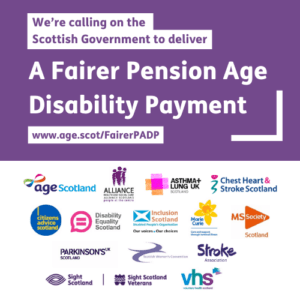Joint call for Scottish Government to improve devolved older age disability payment

A coalition of 15 national charities and organisations coordinated by Age Scotland is calling on the Scottish Government to improve their plans for the new Pension Age Disability Payment by including extra mobility and travel support for recipients. They believe that it would make the system fairer and offer disabled older people a better quality of life.
This extra support, called a mobility component, is available to younger people and people below State Pension age in receipt of disability linked social security such as Personal Independence Payment and Child and Adult Disability Payment, but has not previously been part of the older age equivalent, Attendance Allowance.
Pension Age Disability Payment (PADP) is set to replace Attendance Allowance as a social security benefit in Scotland when it is devolved from next year to Social Security Scotland from the Department for Work and Pensions.
The organisations supporting the call for a mobility component are Age Scotland, Citizens Advice Scotland, The ALLIANCE, Parkinson’s UK Scotland, Inclusion Scotland, Voluntary Health Scotland, Sight Scotland, Sight Scotland Veterans, MS Society Scotland, Disability Equality Scotland, Asthma + Lung UK Scotland, Scottish Women’s Convention, Stroke Association, Chest Heart & Stroke Scotland and Marie Curie.
They believe including a mobility component would help safeguard older people’s independence and participation in society, enhance wellbeing, tackle social isolation and loneliness, and relieve pressure on frontline services, all while combatting poverty and low income challenges.
Attendance Allowance is a much-valued payment which helps many disabled older people with costs and promotes independence. However, although the equivalent disability benefits for children and working age people include a mobility component, Attendance Allowance does not.
A mobility component could potentially give disabled people over State Pension age – who cannot currently get any help through the benefits system with their mobility needs – access to the Motability Scheme, automatic eligibility for a Blue Badge, and the opportunity to apply for an exemption from paying vehicle tax.
The organisations have produced a paper making the case for a mobility component to be included in the new payment and written to the Cabinet Secretary for Social Justice urging the Scottish Government to commit to exploring this proposal. The Social Justice and Social Security Committee has also received a copy of the paper.
The paper is available at www.age.scot/FairerPADP
Age Scotland’s Chief Executive, Katherine Crawford, said:
“Our national helpline regularly hears from older people in receipt of Attendance Allowance looking for information on what is available to support their mobility needs.
“People tell us they feel the current system is deeply unfair, and even ageist, with many unable to access support with their mobility through the benefits system and unsure why they do not qualify for help due to their age.
“Including this component would bring PADP into line with Child Disability Payment, Adult Disability Payment, and DLA – and as such we believe this would align with the stated foundations of the Scottish social security system of dignity, fairness, and respect.
“We believe the Scottish Government can promote fairness and improve the quality of life for older disabled people by including a mobility component within PADP and would strongly urge them to commit to exploring this proposal.”
Disability Equality Scotland’s Chief Executive, Lyn Pornaro, said:
“We join Age Scotland and others in this call to include a mobility component within the PADP. The current system does not allow for fairness and older people in receipt of Attendance Allowance are still mobile but require some support. Including this component, to be inline with Child Disability Payment, Adult Disability Payment and Disability Living Allowance, we allow more independence for older people. It would improve the quality of their lives and reduce that systemic discriminatory practice that is currently in place. We urge the Scottish Government and Social Security Scotland to seriously consider this inclusion – for fairness, dignity and respect”
